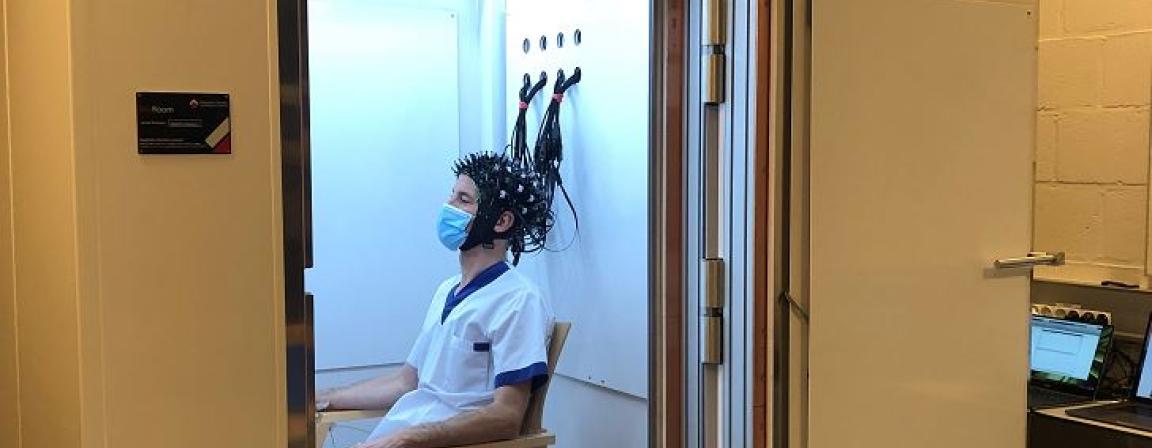Promising progress in the early diagnosis of Alzheimer's
The VUB, UZ Brussels, the ULB and the Brussels University Hospital (H.U.B.), as well as the Brussels start-up Digita.AI, are joining forces to combat Alzheimer's disease. Thanks to funding of 1.2 million euros from Innoviris, the Brussels agency for technology and innovation, researchers will be able to concentrate on improving brain imaging methods. This research aims to develop a tool able to detect Alzheimer's disease at an early stage and consequently anticipate the diagnosis before patients develop dementia. Another promising step in improving care for Alzheimer's sufferers.

The earlier the disease is detected, the better the care
At present, before a person can be confirmed as having Alzheimer's a medical examination by a physician, memory tests and brain imaging are all required. The imaging makes it possible to highlight those areas where there is brain atrophy and regions with agglutinating protein deposits, both symptoms of Alzheimer's disease. To treat Alzheimer's disease it is essential to be able to identify with a high degree of precision, through this imaging, persons at risk of developing the disease before they show signs of dementia. "Among patients where the disease is already very advanced, doctors are able to clearly observe a deterioration of brain activity," explains Jeroen Van Schependom, researcher at the Faculty of Engineering and member of the Etro research group at the VUB. "On a conventional MRI image one can observe the brain atrophy but the imaging is not precise enough to detect Alzheimer's disease. Unfortunately, the diagnosis generally comes when the disease is already at an advanced stage, which leaves very little scope for slowing the disease with drugs. We believe that if we can diagnose Alzheimer's much earlier we will stand a much better chance of controlling the disease with existing medication."
A new method of magnetoencephalography, the key element in this promising project.
A new neuroimaging technique, known as "magnetoencephalography" (MEG), has already shown its effectiveness in detecting anomalies in the brain's functioning caused by Alzheimer's disease, even at early stages. The H.U.B., a grouping of the Erasmus Hospital, the Jules Bordet Institute and the Queen Fabiola Children's University Hospital (HUDERF), is the only hospital in Belgium to possess an MEG. This system studies the functioning of the human brain by means of new MEG sensors, known as "optical-pumped magnetometers" (MPO), which can be placed directly on the scalp of patients. Thus positioned in direct contact with the skull, the MPO open the door to a portable MEG system that is as comfortable and as easy to apply as electroencephalogram (EEG) systems that are in everyday use. By bringing the sensors closer to the bran surface this innovative technology makes it possible to characterise with greater precision the brain functioning at early stages of Alzheimer's disease.
"As it is now possible to place the sensor in direct contact with the skull, the brain's activity can be detected in a more precise and detailed manner than with the former MEG," explains Professor Xavier De Tiège, neurologist and Director of the MEG Unit. "We will be able to localise impairments in brain activity with much greater precision. We have already shown this in connection with another brain disease, epilepsy." Thanks to this new MEG, researchers should be able to detect more rapidly those areas of the brain that are impaired or performing less well, and this from the initial stages of the disease processes.
Essential follow-up of the disease's development
Another important factor in treating patients with Alzheimer's is the long-term follow up of their illness. For this, researchers will be teaming up with Digita.AI, a Brussels-based start-up that works with "datapods". "As we want to detect Alzheimer's disease as early as possible we have to store personal data over a long period," explains Mr Van Schependom. "Digita.AI has developed a system in which everyone has a personal digital 'safe' where they can store their medical data. This means that the patients retain ownership of their data and can decide to make them available for follow-up research. Patients can manage their own data, perhaps assisted by their family. With these 'safes' that are rather like small servers we can monitor patients over a long period and confirm whether the Alzheimer's diagnosis was correct."
The result of cooperation between renowned researchers, namely the VUB, UZ Brussels and the H.U.B., and the Brussels start-up Digital.Al, these innovations represent promising and considerable progress in diagnosing Alzheimer's, an incurable disease that affects 1 in 9 people over the age of 65.